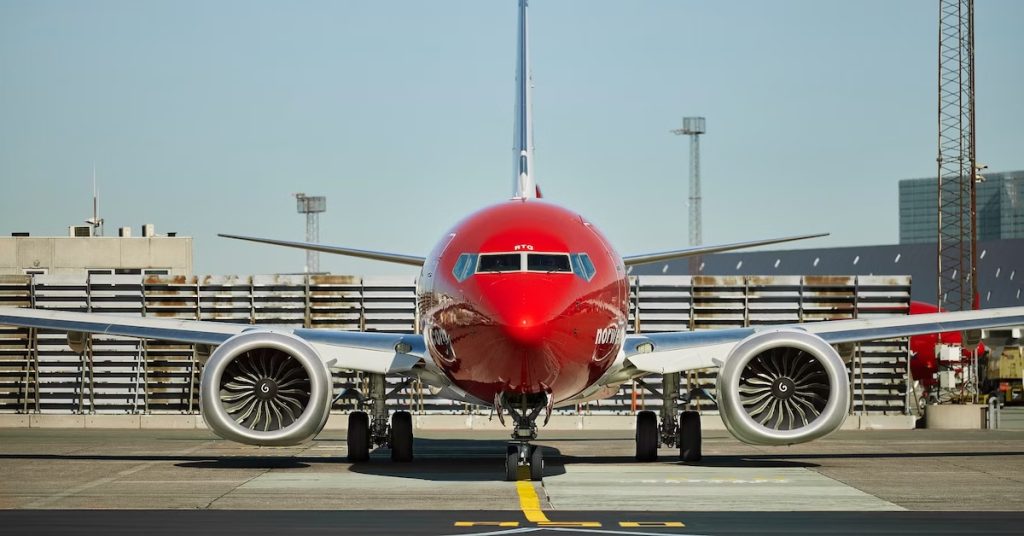Norwegian Air is navigating significant operational challenges due to ongoing delivery delays caused by a Boeing strike. The strike, entering its fourth week, affects over 30,000 Boeing workers, crucial for aircraft manufacturing.
These disruptions drive Norwegian Air to implement strategic cost-saving measures and consider alternatives like lease renewals. Despite these setbacks, the airline continues to showcase resilience with notable traffic growth and plans for a robust winter season.
Norwegian Air Faces Delivery Setbacks Due to Boeing Strike
Norwegian Air has flagged concerns over continuing delivery delays as a result of a prolonged strike at Boeing, now entering its fourth week. This industrial action involves over 30,000 technicians and mechanics who are crucial to the manufacturing process. The delay in the aircraft deliveries, which were already lagging, poses challenges for Norwegian Air’s operational planning.
The airline’s CEO, Geir Karlsen, has expressed that these delays will stretch well into next summer, necessitating cost-saving measures. He commented, “This will delay our deliveries well into next summer and increase short-term costs, requiring us to prioritise cost-saving measures.” This situation underscores the importance of strategic planning in supply chain management within the aerospace sector.
Operational Adjustments and Mitigating Strategies
In response to the delayed aircraft deliveries, Norwegian Air is exploring various mitigating actions to counter the shortage of aircraft. One key strategy being considered is the renewal of leases on existing planes. This approach aims to bridge the gap in fleet capacity and maintain service levels for the airline’s customers. Operational flexibility remains a critical component of Norwegian Air’s strategy.
The challenges faced by Norwegian Air are a reminder of the intricate dependencies in the aviation industry’s supply chains. Any disruption can have ripple effects across the entire operational framework. Consequently, the airline is focused on maintaining robust cost management and preparedness to adapt to changing circumstances.
Traffic and Capacity Growth Despite Challenges
Despite the difficulties presented by the delivery delays, Norwegian Air recorded favourable traffic growth figures in September. Load factors increased, contributing to a double-digit rise in capacity.
The group operated an average of 86 aircraft last month, marking a 10% increase in capacity year-on-year. Passenger numbers rose by 11%, reaching 2.6 million across its brands Norwegian and Wideroe. These statistics highlight the airline’s resilience and ability to attract passengers amidst operational hurdles.
Geir Karlsen noted, “I am pleased that we have increased load factors throughout the summer and into the autumn season.” The statement reflects the airline’s strategic focus on maintaining passenger engagement even when faced with logistical challenges.
Passenger Demand and Seasonal Performance
The autumn school holiday period in Norway has so far been successful for the airline, indicating strong passenger demand. Looking ahead, Norwegian Air is anticipating a bustling October and a vibrant winter season, filled with new and exciting destinations.
The optimistic outlook for the upcoming seasons demonstrates Norwegian Air’s confidence in its market positioning and ability to deliver attractive travel options. This positive sentiment is crucial in sustaining customer interest and loyalty.
Norwegian Air’s strategic planning is geared towards leveraging seasonal demand to compensate for delivery delays. The alignment of marketing and operational strategies illustrates the airline’s capacity to adapt and innovate.
Financial Implications of Delivery Delays
With delays in aircraft deliveries, Norwegian Air is compelled to prioritise cost-saving initiatives. The financial implications of these delays are multifaceted, affecting both short-term spending and long-term capital planning. The airline’s focus on financial prudence reflects an industry-wide need for agility in financial management.
The proactive adoption of cost-saving measures is essential for maintaining financial stability in volatile market conditions. Airlines must navigate complex financial landscapes to ensure sustainable operations while facing external pressures such as strikes and supply chain disruptions.
Future Prospects and Strategic Outlook
Norwegian Air is committed to overcoming the challenges presented by the Boeing strike through strategic management and planning. The company’s proactive approach to lease management and cost-saving measures are key to mitigating impacts on future operations.
The airline’s ability to maintain operational momentum despite facing potential setbacks is indicative of its robust strategic framework. Norwegian Air is expected to continue prioritising customer satisfaction and operational efficiency amid industry challenges. This forward-thinking approach positions the airline well for future growth and competitive advantage.
Conclusion
Norwegian Air’s adept handling of delivery delays due to the Boeing strike showcases its capability to manage operational challenges effectively. By maintaining focus on strategic adjustments and customer engagement, the airline is poised to emerge resilient from current adversities.
Norwegian Air continues to demonstrate resilience amid supply chain disruptions, prioritising operational efficiency and customer engagement. Strategic planning and adaptability remain central to overcoming current challenges, securing the airline’s future growth.

